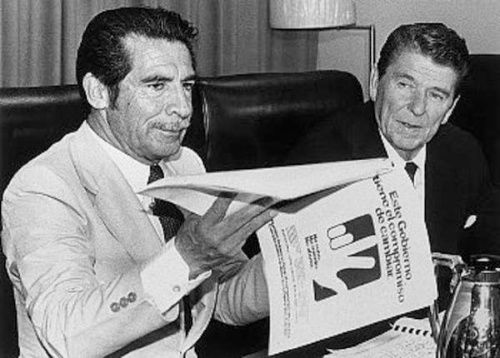By Cyril Mychalejko
The United States has waged a war on democracy in Central America for decades. It is instructive to look back at how Washington responded to past democratic movements in the region and how that has shaped the current democratic crises countries like Guatemala and Honduras are facing. READ MORE
By Heather Gies
Massive anti-corruption movements are waging in Guatemala and Honduras. While some have hailed the moment of popular discontent as a “Central American spring,” others remain cautious about overestimating the potential of broad and politically sporadic movements to achieve any lasting structural change. What is their potential for accomplishing radical, structural changes? READ MORE

Karen Spring, Honduras-based coordinator of the Honduras Solidarity Network, spoke to teleSUR about Honduras' anti-corruption movement and its potential. Spring says “it’s crucial to analyze and contrast the current indignados movement with the post-coup social movement/Resistencia/FNRP. This current movement does not even come close to the structural, transformative demands of the post-coup movement.” READ MORE
By Kelsey Alford-Jones
Guatemala is facing a historic opportunity to bring about meaningful reform in a moment when the nation is on the verge of complete institutional collapse. With unprecedented momentum building to address unbridled government corruption and impunity, the biggest impediment to successful reform may be the Sept. 6 elections. READ MORE

By Grahame Russell
Most Guatemalans also consider President Otto Perez Molina to be a war criminal. Like Rios Montt, who he worked under, Perez Molina was a “School of the Americas” graduate, and was also an alleged CIA asset. In fact, in 2013, Hugo Reyes, a former soldier who served under Perez Molina in Nebaj, testified via video during the Rios Montt’s genocide trial that: "The soldiers, on orders from Major 'Tito Arias,' better known as Otto Perez Molina ... coordinated the burning and looting, in order to later execute people." READ MORE
By Alexandra Pedersen
In Latin America, Canada and its extractive industry are viewed as the new conquistadors; they are thirsty for land and minerals and hungry for power. Canada’s multinationals work hand-in-hand with corrupt governments and threaten democracy in post-conflict Central American nations. READ MORE

Dawn Paley, author of “Drug War Capitalism,” spoke with teleSUR about how U.S. policies are increasing violence and exploitation in the region. She says “it is important that we explore connections between the militarization forged through plans like the Central America Regional Security Initiative and the Alliance for Prosperity and increasing structural violence in host countries.” READ MORE
By Michael Busch
While protest movements are gaining steam in its regional neighbors, El Salvador descends further into social crisis. That Salvadorans haven’t taken to the streets in protest speaks volumes about the depth of perceived insecurity they experience in the face of gang power. High levels of violence are clearly a deterrent to political action. READ MORE
Honduras' Indignados Torch Protests

From Reagan to Obama: Forced Disappearances in Honduras
Disaster Capitalism and Outrage in Post-Coup Honduras
Honduran Democracy Still in Crisis 6 Years After Coup
Women’s Rights and Textile Factories in Central America
Aguan, Honduras: World Bank Backs Death Squads and Displacement
Guatemalan Supreme Court Approves Impeachment of President
Guatemala: The World Bank, a Hydroelectric Dam, and Massacres
OceanaGold vs El Salvador: Foreshadowing 'Trade' Under the TPP?
Rudy Giuliani Descends on El Salvador
Government of El Salvador Warns Against 'Movement for a Coup'